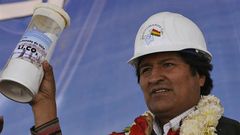Evo Morales
(politician) | |||||||||||||||||||
|---|---|---|---|---|---|---|---|---|---|---|---|---|---|---|---|---|---|---|---|
 Evo Morales holding a sample of Bolivian-produced Lithium Carbonate in 2009 | |||||||||||||||||||
| Born | Juan Evo Morales Ayma 1959-10-26 Isallawi, Bolivia | ||||||||||||||||||
| Religion | Indigenous Andean religion | ||||||||||||||||||
| Parents | Dionisio Morales Choque María Ayma Mamani | ||||||||||||||||||
| Children | Eva Liz Álvaro | ||||||||||||||||||
| Party | Movement for Socialism | ||||||||||||||||||
| |||||||||||||||||||
Evo Morales is the former President of Bolivia, one of the longest serving leaders in Latin America and Bolivia's first indigenous leader.
After a controversial decision by the constitutional court to scrap presidential term limits, Evo Morales ran for a fourth consecutive term in office in October 2019. But the result of the presidential election was challenged after the US-backed opposition led by Carlos Mesa rejected the country’s October 20 election results.
Morales ultimately resigned on 10 November 2019 under pressure from Bolivia’s armed forces and went into exile in Mexico.[1]
'Assassination attempt'
On 21 November 2019, Evo Morales claimed there was “zero doubt” that a mechanical failure that occurred on a helicopter he was travelling on in October had been an 'assassination attempt' and no accident. Morales, who fled Bolivia for asylum in Mexico last week after being ousted in a right-wing military coup, said he regularly used helicopters multiple times a day and even in bad weather, and nothing like that incident had ever happened. He pinned blame for the alleged assassination attempt on Air Force General Jorge Gonzalo Terceros Lara, who he said had “changed completely” in recent times. He also pointed to the fact that coup leader Luis Fernando Camacho had announced on the same day that Bolivians were about to “witness Evo’s fall” and that it would be “captured on video.”
- “When the news came that we survived the crash that night, those who expected the president to die in it were disappointed,” he said.
Appeal to the UN
Evo Morales called on the United Nations to intervene and denounce the coup and subsequent massacre by police of indigenous Bolivians who protested his ouster after self-declared "interim president" Jeanine Añez took power by force.[2]
On 2 February 2020, Morales said that he will denounce before international bodies the theft and loss of his documents, as part of the political persecution against him by the coup regime in Bolivia. He accused Arturo Murillo, the Interior Minister appointed by self-proclaimed President Jeanine Añez, and Colonel Ivan Rojas, national director of the Special Force to Fight Crime.[3]
Exploiting Bolivia's Lithium
On 22 November 2019, Evo Morales was reported to have said that the recent political coup which forced him to step down was designed to install a leader who will open Bolivia’s Lithium reserves to international exploitation:
- “In Bolivia we could define the price of Lithium for the world...Now I have realised that some industrialised countries do not want competition,” Morales said while speaking with former Ecuadorian President Rafael Correa according to an exclusive RT report.
Morales had been seeking to nationalise the extraction of the country’s Lithium reserves in order to "secure the country's future," and his forced resignation came only a week after he cancelled a massive joint Lithium project with a German company. RT also reported that the US-based Tesla company, which uses Lithium batteries for its electric cars, saw its stock jump after Morales' departure.
Estimated to be at around 900 million tonnes, Bolivia’s Lithium reserves are believed to contain 70 percent of the world’s known Lithium, representing a lucrative market for international investors and competitors. The mineral is essential in the manufacturing of long-lasting batteries and electric cars.
According to a report published by the German carmaker Volkswagen earlier this year, Lithium "will in the near future be one of the most sought-after raw materials on earth.” The report added that forecasts indicate that demand for the mineral “will more than double by 2023” largely due to the car industry.[4]